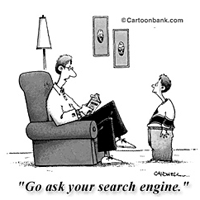Chris “Silver” Smith of NetConcepts gives seven basic ways to appease the Google gods (and why that means Yahoo!, MSN and Ask will like you too)
T his week I’m at O’Reilly’s Web 2.0 Expo in NYC. Today in a workshop called SEO 101, Chris “Silver” Smith, Lead Strategist at NetConcepts gave a list of the seven most important things you can do to get your pages ranked in Google.
his week I’m at O’Reilly’s Web 2.0 Expo in NYC. Today in a workshop called SEO 101, Chris “Silver” Smith, Lead Strategist at NetConcepts gave a list of the seven most important things you can do to get your pages ranked in Google.
One of the first things he noted (and we get asked about this a lot) is that “being Google-friendly means being friendly to every other search engine”.
Why? Firstly, because Google has more than a 71% share of search volume. Secondly, because Google has the most rules and requires the highest level of optimization to get ranked. Therefore, if you please the Google gods, you’re likely pleasing the Yahoo! MSN, and Ask gods. If not, ask yourself who is more important.
According to Hitwise, as of August 2008, this is the volume of search requests going to each of the top four search engines:
- Google (including AOL, Netscape, iWon, etc.) — 71.01%
- Yahoo (including AllTheWeb, AltaVista, Lycos, CNN, etc.) — 18.26%
- MSN — 4.25%
- Ask — 3.45%
Here are Smith’s 7 ways to get ranked in Google:
1. Optimize your title tag. We’ve told you this again and again. Using “Welcome to our website” as your title tag doesn’t work. For a winning example, take a look at BHG.com whose title tag reads: “Better Homes and Gardens – home decorating and remodeling ideas, gardening, recipes, and more”. Can you find the keywords? Google can.
2. Optimize your home page. This page is the one you’re least likely to optimize due to the variety of keywords it encompasses, but it’s still important. This is because external sites will more than likely be linking to your home page. While we’d recommend linking to your free report pages and conversion pages in any blog comments you leave or anytime you leave a link from an external site, you can’t control what other people do. Link building will help you rise in search engines, while keyword optimization will give you that extra boost.
3. Make sure every page of your site has a “song”. This is referring to your keywords. Every page on your website should have a keyword theme that aligns between the content and products. Your meta title, description, blog post and related products should all include the same keywords.
[text_ad]
4. Make your keywords a part of EVERYTHING. On any given page, you should use a single keyword in the title tag, hyperlink text, headings (H1 and H2 tags), image alt tags, and high up in the page where they’re given more “weight” to Google. When you upload your images, you can also use keywords in the image filename.
5. Eliminate extraneous HTML code. If you don’t need extra code in the page, get rid of it. Smith noted that this is a big argument for using CSS.
6. Meta Tags are not a magic bullet. Smith noted that “you can’t found all of your optimization hopes on having great keywords and meta tags anymore”. He explained that since people have learned how to manipulate meta tags, search engines have downgraded them in importance. Meta descriptions and titles are still very important, but keyword tags have become almost obsolete. Google rarely reads them, and in many cases, you’re more likely to get penalized for using extra keywords than for not having them at all.
7. Use text for navigation, not graphics. This goes for every area of your website. Instead of having graphics for your buttons, use CSS buttons with text in them. This adds valuable search text to your page that would otherwise be lost in images that Google can’t read.
More notes and quotes from the Web 2.0 Expo (and still more to be added so stay tuned):
7 Ways to Get Ranked in Google
Web 2.0 Supply & Demand Metrics


